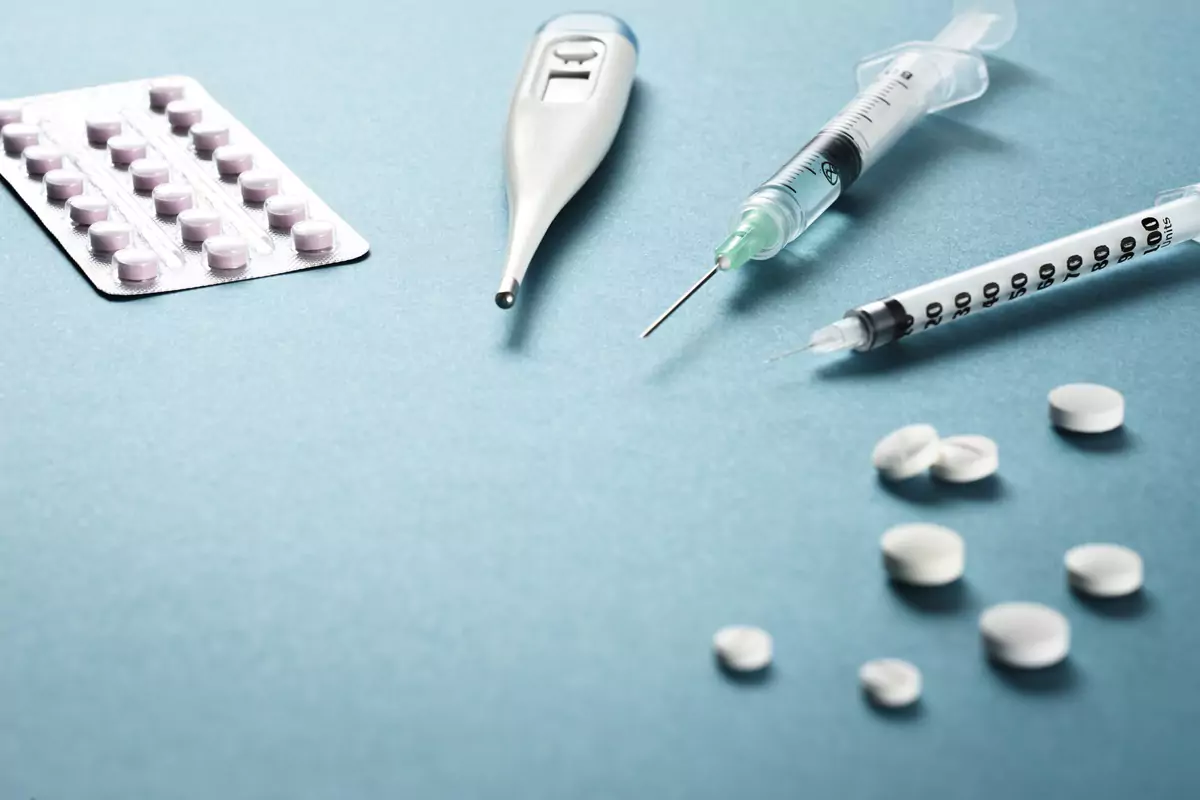
UP TO 40% OFF SITEWIDE






Metformin Versus Berberine: Uncovering the Differences


Table of Contents
- What Are The Main Differences Between Metformin & Berberine?
- Mechanism of Action
- Side Effects: A Detailed Comparison of Metformin and Berberine
- Dosage and Administration
- What Effects Does Each Have On Blood Sugar?
- Should Different People Take Berberine Over Metformin?
- Potential Interactions
- SugarMD Super Berberine
- Conclusion
- About The Author
Metformin and Berberine are two natural compounds that have been used for decades to help regulate blood sugar levels. These compounds are both popular choices for people with diabetes or pre-diabetes but have you ever wondered what the key differences between metformin and berberine are? In this article, we'll explore the distinctive features of metformin and berberine and outline the potential health benefits and side effects of each.
We'll also discuss how they affect blood sugar, who should take one over the other and end with a short comparison of the cost and potential interactions of each compound. So if you're curious about the similarities and differences between metformin and berberine, read on to find out more.
What Are The Main Differences Between Metformin & Berberine?
When it comes to the discussion of metformin versus berberine there are a few distinct differences that are worth exploring. Both of these compounds are used to treat and manage diabetes and related metabolic conditions.
Metformin the most commonly prescribed medication to treat type 2 diabetes, is a synthetic drug that works by suppressing glucose production in the liver. Berberine, on the other hand, is a natural supplement derived from a variety of Chinese herbs that helps lower blood sugar levels by stimulating the production of insulin.
Mechanism of Action
The first major difference between metformin and berberine is the way in which they work to control blood sugar levels. Understanding this difference is important for patients and healthcare providers to make informed decisions about which medication may be the best option for an individual. Metformin is a biguanide medication that has been used for decades to treat type 2 diabetes.
It works by reducing the amount of glucose produced by the liver and improving insulin sensitivity. The liver is responsible for producing glucose which is then released into the bloodstream as a source of energy for the body. In individuals with type 2 diabetes the liver often produces too much glucose, leading to high blood sugar levels.
Metformin works by reducing the amount of glucose produced by the liver which helps to regulate blood sugar levels. Additionally, metformin improves insulin sensitivity which is the ability of the body to respond to insulin and use glucose effectively. Insulin resistance is a major factor in the development of type 2 diabetes and improving insulin sensitivity can help to better regulate blood sugar levels.
Metformin does this by decreasing insulin resistance in peripheral tissues such as muscle and fat which helps to improve glucose uptake and utilization. Berberine, on the other hand, is an alkaloid extracted from various plants and has been used for centuries in traditional medicine for a variety of health conditions. In the treatment of type 2 diabetes, berberine has been shown to have a number of beneficial effects, including improving insulin sensitivity and reducing glucose absorption in the gut.
Berberine works by improving insulin sensitivity in a number of ways. First, it increases the expression of glucose transporters in peripheral tissues which helps to improve glucose uptake and utilization. Additionally, berberine has been shown to increase the expression of insulin receptors which helps to improve insulin sensitivity.
Berberine also works by reducing glucose absorption in the gut which helps to regulate blood sugar levels. Berberine has been shown to have a number of other beneficial effects in individuals with type 2 diabetes, including reducing inflammation, improving lipid metabolism, and reducing oxidative stress.
These additional effects may contribute to the overall effectiveness of berberine in managing blood sugar levels. It is important to note that while both metformin and berberine have been shown to be effective in managing blood sugar levels they work in different ways to achieve this goal.
Understanding the mechanism of action of each medication can help patients and healthcare providers to make informed decisions about which medication may be the best option for an individual.
Side Effects: A Detailed Comparison of Metformin and Berberine
One of the most commonly reported side effects of metformin is gastrointestinal distress such as nausea, diarrhea and abdominal discomfort. These symptoms are usually mild to moderate in severity and can often be managed by taking the medication with meals or reducing the dose.
However, in some cases, the gastrointestinal side effects can be so severe that patients are unable to continue taking the medication. Unlike metformin, berberine has been associated with fewer gastrointestinal side effects. However, some patients taking berberine have reported dizziness, headache or a rash. These side effects are usually mild and short-lived and can often be managed by reducing the dose or discontinuing the medication.
In addition to the differences in side effects there are also differences in the way that metformin and berberine interact with other medications. Metformin can interact with certain medications such as antibiotics that affect the gut microbiome. This can lead to an overgrowth of bacteria in the gut which can exacerbate gastrointestinal side effects and increase the risk of developing a potentially serious condition known as lactic acidosis.
Berberine, on the other hand, has been shown to have fewer interactions with other medications and is generally considered to be safer in this regard. Another important factor to consider when choosing between metformin and berberine is the individual's overall health status. While both medications have been well-tolerated in clinical trials some patients may have underlying health conditions that make one drug a better choice than the other.
For example, individuals with kidney or liver disease may not be able to take metformin as it is eliminated from the body by the kidneys and liver. Berberine, on the other hand, is primarily metabolized by the liver and may be a better option for individuals with kidney disease. It is also important to note that while both metformin and berberine have been shown to be effective in managing blood sugar levels they are not a cure for type 2 diabetes.
Patients taking these medications must also make lifestyle changes such as following a healthy diet and exercising regularly, in order to achieve the best results. In conclusion, both metformin and berberine can be effective in managing blood sugar levels in patients with type 2 diabetes.
However, the differences in side effects, interactions with other medications and overall health status should be taken into consideration when choosing between these two drugs. As always, it is important to consult with a healthcare provider before starting any new treatment, in order to determine the best course of action for your individual needs.
Dosage and Administration
The third difference between metformin and berberine is the way in which they are taken and the recommended dosages for each drug. This aspect of the treatment of type 2 diabetes is just as important as the efficacy of the medication and the side effects it may cause. Metformin is typically taken orally and is available in tablet form. The recommended daily dose of metformin can range from 500 mg to 2,000 mg, depending on the individual patient and the severity of their diabetes.
The starting dose is usually 500 mg once a day, taken with the evening meal. The dose can then be gradually increased over time, with the goal of reaching the maximum tolerated dose which is typically 2,000 mg per day. It is important to note that metformin should be taken with food to minimize the risk of gastrointestinal side effects such as nausea, diarrhea and abdominal discomfort.
In addition, patients with kidney or liver problems or those who are elderly may require a lower dose of metformin as these populations are at increased risk for metformin-related side effects. Berberine, on the other hand, is usually taken as a dietary supplement and is available in capsule form. The recommended daily dose of berberine can range from 500 mg to 1,000 mg, depending on the individual patient and the severity of their diabetes.
Berberine supplements are often taken two or three times per day, with meals, to improve their efficacy. It is important to note that berberine is not regulated by the FDA and the quality and purity of berberine supplements can vary widely. In addition, berberine has not been extensively studied in clinical trials so there is limited information available on its safety and efficacy.
As a result, it is important for patients to speak with their healthcare provider before starting a berberine supplement, to ensure that it is safe and appropriate for them. The differences in dosage and administration between metformin and berberine are important to consider when choosing a treatment for type 2 diabetes. Metformin is taken orally and is available in tablet form, with doses ranging from 500 mg to 2,000 mg per day.
Berberine is taken as a dietary supplement and is available in capsule form, with doses ranging from 500 mg to 1,000 mg per day. It is important to speak with a healthcare provider before starting either medication, to ensure that the proper dose and administration is chosen for each individual patient.
What Effects Does Each Have On Blood Sugar?
When it comes to controlling blood sugar levels, Metformin and Berberine are both highly effective. Both Metformin and Berberine can effectively reduce blood sugar levels, although Metformin has more research to support it.
In terms of side effects, Metformin can cause nausea, diarrhea and fatigue. Berberine may cause nausea and stomach upset as well as an increased risk of hypoglycemia. Therefore, it is important to consult a doctor before taking either supplement to ensure proper dosing and to identify any potential interactions or side effects.
Should Different People Take Berberine Over Metformin?
When it comes to choosing the best treatment for managing diabetes and other related conditions, it is important to consider metformin versus berberine. Both these substances are used to treat these medical conditions, although each has its own benefits and drawbacks.
While there is no clear-cut answer as to which one should be taken, since everyone's medical conditions vary, it is important to understand the differences between these two substances. When deciding whether to take berberine or metformin, it is important to consider the individual's medical conditions and the potential side effects associated with both substances.
While there is no clear-cut answer as to which one is better, understanding the differences between them can help people make an informed decision regarding their health.
Potential Interactions
When comparing metformin versus berberine, it is important to consider interactions between the two. Metformin can interact with a variety of medications, including other antidiabetics, ACE inhibitors and angiotensin receptor blockers, salicylates, sulfonamides and nonsteroidal anti-inflammatory drugs (NSAIDs).
Moreover, some dietary supplements such as St. John's Wort can also interact with metformin. On the other hand, berberine can interact with several types of medication, including warfarin, cyclosporine and lithium. Additionally, those taking berberine must watch for interactions with other herbs and supplements such as St. John's wort, echinacea, ginkgo biloba and goldenseal.
It is important for individuals to consult their healthcare provider before taking either metformin or berberine to ensure that potential interactions with other medications or supplements are monitored and minimized.
SugarMD Super Berberine
SugarMD Super Berberine is a superior supplement for those seeking to maintain healthy glucose metabolism and reduce inflammation. Unlike other supplements, it utilizes a potent blend of dihydro berberine and 100% pure Ceylon Cinnamon to ensure that blood sugar remains in a healthy range.
Additionally, this formula is safe and effective for long-term use. Regular use of this product will lead to a significant reduction in inflammation which is a well-known contributor to a wide range of health issues. If you're looking for a supplement that can help you maintain healthy glucose levels while reducing inflammation, SugarMD Super Berberine is the perfect choice.
Conclusion
In conclusion, both metformin and berberine have their own unique benefits and drawbacks. Metformin is a strictly regulated drug with numerous studies supporting its effectiveness in reducing blood sugar. On the other hand, berberine is a natural supplement without much research behind it and can possibly have more side effects than metformin.
While both compounds have potential interactions, no major adverse effects have been documented. Ultimately the choice between metformin and berberine should be based on the individual’s health history, severity of their condition and cost factor – both of which can vary from person to person. As always, it’s best to consult a health care provider to make an informed decision.
About The Author
Meet Dr. Ahmet Ergin a highly skilled and dedicated endocrinologist with a passion for diabetes care. Dr. Ergin earned his medical degree with honors from Marmara University in Istanbul. He completed internal medicine residency and endocrinology fellowship at Cleveland Clinic.
Dr. Ergin is board-certified in Internal Medicine, Endocrinology, Diabetes and Metabolism due to his vast medical expertise. He's a certified diabetes educator, author of "The Ultimate Diabetes Book," and founder of "the SugarMD YouTube channel."
Dr. Ergin offers exceptional diabetes care to his patients in Port Saint Lucie, FL, helping them manage effectively. Disclaimer: The website's disease and treatment info is general guidance and not a substitute for professional healthcare advice.
Seek professional advice for personalized diagnosis and treatment plans to ensure accurate and effective care. Consult a qualified healthcare professional for any questions about your health and wellness.
Written By Dr. Ahmet Ergin
469 total articles
Meet Dr. Ahmet Ergin, a highly skilled and dedicated endocrinologist with a passion for diabetes care. Dr. Ergin earned his medical degree with honors from Marmara University in Istanbul. He completed internal medicine residency and endocrinology fellowship at Cleveland Clinic. Dr. Ergin is board-certified in Internal Medicine, Endocrinology, Diabetes, and Metabolism due to his vast medical expertise. He's a certified diabetes educator, author of “The Ultimate Diabetes Book,” and founder of “the SugarMD YouTube channel.” Dr. Ergin offers exceptional diabetes care to his patients in Port Saint Lucie, FL, helping them manage effectively. For a closer look into his insights and experiences, connect with Dr. Ahmet Ergin on LinkedIn, Instagram, and YouTube.”
Disclaimer: These statements have not been evaluated by the Food and Drug Administration. Information on this website isn't intended to treat, cure or prevent any disease. Discuss with your doctor and do not self-treat.
Products















